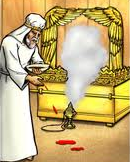apart from bloodshedding no remission?
12-10-2011 - Posted by Andre Piet

And almost all things are by the law purged with blood; and without shedding of blood is no
remissionliberation. Hebrews 9:22 (KJV)
forgiveness In a series of blogs I explained that the Greek word aphesis, which generally is translated as forgiveness (pardon), in reality signifies release or liberation. Many Scripture passages are, consequently, to be seen in a different light, as I showed in the previous blog. One example that deserves a special mention is the above posted Bible verse from Hebrews 9. There, it is recounted that under the Old Covenant almost everything in the Tabernacle by means of blood was ritually cleansed, with the remarkable addition “and without shedding of blood there is no remission”. I call this addition remarkable, because remission (>forgiveness) is here, not at all, the subject. It also raises again the absurd suggestion that God could not forgive sins without the shedding of blood. Is He “bloodthirsty” before being able to forgive? Indeed, this Bible verse is, in classical theology, the proof text of choice for this doctrine (>Satisfaction Atonement). Would we, however, as I argued, here replace forgiveness (remission/pardon) with liberation, then not only would it cancel this proof-text, but it is would also remove the main pillar of this doctrine. blood outpouring For a proper understanding, it should also be noted, beforehand, that the word “bloodshedding” in Heb.9:22 does not relate to the slaughter of an animal, but to the outpouring and sprinkling of the blood, afterwards. This is evident from the context, from the Greek word which is a composite of ‘out’ and ‘pouring’ (i.e., “outpouring”) and how the Septuagint (LXX) this Greek word uses. cleansing = liberation of impurity Hebrews 9:22 does not teach that God cannot forgive without the shedding of blood. This verse is about cleansing. The tabernacle had to be cleansed (purified), and in that way be liberated from impurity. This purification was done by means of the blood of slain animals. The writer of Hebrews continues by saying (verse 23) that this is a representation of the purification of heavenly things through the one-time sacrifice of Christ (verses 24-26). The sacrifice (=up-rising/ascension) of Christ speaks of His resurrection, after He had first been slain. He has “gone into heaven, and messengers angels and authorities and powers being made subject to Him” (1Petr.3:22). So He cleanses and purifies heaven, and liberates her from all impurity. caricature One thing must be clear: Heb.9:22 has NOTHING to do with the unbiblical idea of a god who can only forgive when he first has seen blood. No greater caricature than this can be imagined of the God of the Bible, Who on the cross showed the very opposite: even when the world killed My beloved Son, I still love them, undiminished! ——————————— translation: Peter Feddema ![]()

 English Blog
English Blog